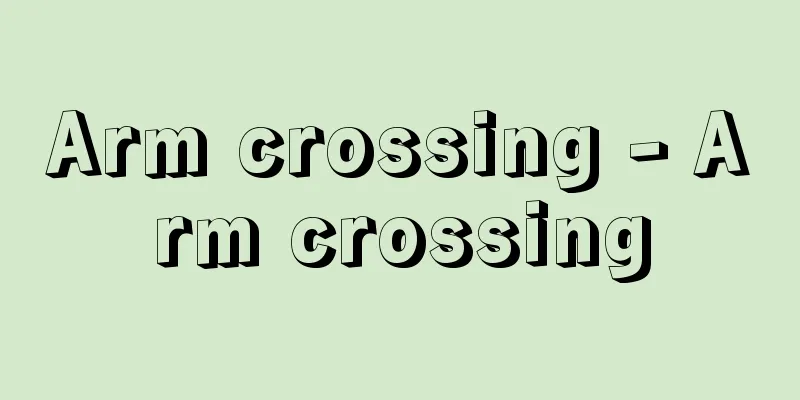Arm crossing - Arm crossing

|
…Amphibian or higher vertebrates, i.e., tetrapods, have a pair of forelimbs and hind limbs that evolved from the pectoral and pelvic fins of higher bony fishes. These originally developed as terrestrial walking organs, but evolved in various ways as terrestrial animals adapted to life on land. When the forelimbs (or hands) have a function that is significantly different from that of the hind limbs and that is used to grasp or manipulate objects skillfully, as is the case with relatively large and higher-level monkeys and humans, they are called arms. The forelimbs of relatively primitive monkeys, mice, squirrels, bears, and other animals also have this function to some extent, but they are not usually called arms and are commonly called forepaws, as in most other tetrapods. (The forelimbs of birds and bats are wings, not forepaws, and those of whales are commonly called pectoral fins or flippers.) … From [Exercise] ...Large birds can also glide without moving their wings, but many use updrafts to soar up and down. *Some of the terminology explanations that refer to "arm crossing" are listed below. Source | Heibonsha World Encyclopedia 2nd Edition | Information |
|
…両生類以上の脊椎動物つまり四足動物は,高等硬骨魚類の胸びれ・腹びれからそれぞれ発展した前肢・後肢を1対ずつ備えている。これらは本来は陸上での歩行器官として発達したものだが,陸生動物の適応に伴ってさまざまに分化した。比較的大型で高等なサル類やヒトにみられるように,前肢(または手)が後肢と著しく異なって物をつかんだり器用に取り扱ったりする働きをもっている場合,その前肢を腕と呼ぶ。比較的原始的なサル類やネズミ,リス,クマなどの前肢もある程度このような働きをもっているが,これらは普通は腕とは呼ばず,その他の大半の四足動物と同じく俗に前足という(鳥類とコウモリ類の前肢は前足ではなく翼であり,クジラ類のそれは俗に胸びれまたはひれあしと呼ばれる)。… 【運動】より…大型の鳥も翼を動かさずに滑空することがあるが,多くの場合,上昇気流を利用して舞い上がったり舞い下りたりする帆翔soaringをしている。 ※「腕わたり」について言及している用語解説の一部を掲載しています。 出典|株式会社平凡社世界大百科事典 第2版について | 情報 |
>>: Uterin Bellum - Uterin Bellum
Recommend
Hydroponics - Suiko
The method of growing plants using a medium contai...
Ishidateyama
...The saddle leading to Mt. Maruzasa is Minokosh...
Russo-Japanese War
This war took place between February 1904 (Meiji ...
Splash erosion
…Rain wash is the process by which rainwater dire...
Absorption relationship
For example, cases that fall under both breach of...
Sadaie Kira
Years of birth: Years of birth and death unknown. ...
Amnesia - Kenbo
A type of quantitative disorder of memory, in whi...
Thermae
… Baths became commonplace and gained importance ...
Onidaiko - Demon drum
A folk performing art performed at spring festival...
Bench - Endai
A rectangular seat that can be placed outdoors an...
Night Watchman State (English: Nachtwächterstaat German)
The capitalist view of the state from the mid-17t...
Chloroplasts - chloroplast
A structure unique to the green cells of green pl...
La Fayette's jungle fowl
...It is distributed in western India, and in cen...
Kakeri
It is also written as "Sho". It is the n...
Educational technology
It has been used in Japan since the early 1960s, ...









